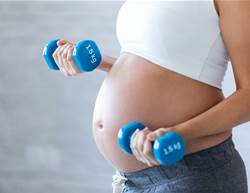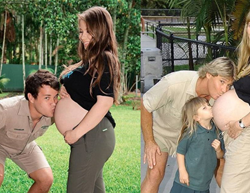Before bariatric (aka weight loss) surgery, my highest recorded weight was 134kgs. I had tried dieting, but it was never enough, and exercise was a real struggle: I have an autoimmune disorder that affects my back and causes pain. You sometimes hear horror stories about people who can't eat anything and have a miserable experience after bariatric surgery, but that wasn't me. I felt amazing! I lost weight pretty quickly and steadily. I did very well staying away from the "no-no" foods, and most of what I did eat I tolerated very well.
Then, six months later, I found out I was pregnant.
I hadn't intended to get pregnant. I already had two children at the time—my oldest was almost 5, and my youngest was almost 3—and I was on the mini pill. It's true that the mini pill, statistically speaking, is only so effective, but most other contraceptives weren't an option. (I'd previously had trouble with IUDs staying put, and Depo-Provera can cause weight gain. I also get weird migraines, so I can't take regular birth control pills.) The mini pill had worked for me the past, so I thought it would again. Obviously, it didn't.
While many women have successful pregnancies after bariatric surgery, doctors usually advise waiting at least 18 months after surgery before you conceive. In the beginning, your body is in rapid weight-loss mode, and that was certainly the case for me. By the time I took a positive pregnancy test, I'd lost 45kgs.
Here I grow again
After the initial shock wore off, I started to get pretty scared. Would I lose the baby due to malnutrition or issues with kilojoule intake? After bariatric surgery, your daily kilojoule intake is highly restricted: I was only eating 2500 kJs a day. While some people imagine that it's hard to eat so little, after weight loss surgery it's actually difficult to eat that much. My appetite had plummeted, plus it's hard from a mental standpoint since you know that you're supposed to be losing weight.
After I got pregnant, eating was even more challenging. During the first trimester everything made me want to throw up, plus I was also dealing with something gastric bypass patients call the "foamies." It's like the acid that sometimes comes before you throw up, but it just continues to kind of foam in the back of your throat, sometimes for 30-40 minutes, with no throwing up.
My obstetrician had me immediately start seeing a nutritionist once a month who was familiar with bariatric surgery and pregnancy, just to make sure that I was getting enough to sustain a healthy pregnancy. Since I could only eat a very small quantity of food at a time, she had me add some foods to my diet that were very dense in calories, like heavy cream, coconut oil and butter. By the time I was 18 weeks I had lost about another 5kgs, but once I got the hang of eating what I needed for the baby, my weight stabilised.
While most women are advised to gain about 11 kgs during pregnancy, my doctor said I should try to avoid gaining or losing at this time. I managed to do that—toward the end of my pregnancy I regained the 11 kgs that I lost early on, but nothing more. But my body did change shape, which was emotionally challenging: As I watched it happen, I remember thinking, "Well, this isn't the direction I wanted my stomach to go."
But there were also positives. During my last pregnancy I was close to 136kgs, so I never had that cute pregnant look. This time around, I had that perfect little baby bump. I even decided to get maternity photos taken, which is something I never considered with my first two. Back then, I didn't feel "pregnant pretty;" I think everyone just assumed I was extra fat.
Prenatal care(ful)
From a medical standpoint, most of my prenatal care ended up being pretty standard. I did meet with a perinatologist in the beginning, just to have baseline information on the pregnancy in case something came up later. It never did, so I kept having regular obstetrician visits.
One notable change was that my blood sugar had to be monitored in a different way. During my other pregnancies I had the typical oral glucose tolerance test, which involves drinking 50 grams of sugar in five minutes. But after bariatric surgery, an influx of sugar (or fat) into your digestive system causes dumping syndrome—a condition that causes your bowels to get rid of everything in them very quickly. You get sweaty, your heart races, you feel dizzy and your stomach cramps—it’s horrible and painful. You just want to lie down and die.
To avoid that, my obstetrician skipped the glucose tolerance test and instead gave me an A1C blood test, which doesn't involve drinking any sugar. Then she rechecked it at 26 weeks and also had me do a fasting glucose test.
Birth day and beyond
I have very fast deliveries—my first two kids came very quickly, and my third was exactly the same. My delivery was very normal. No complications at all. A lot of people are concerned that you can't nurse after you've had gastric bypass because you won’t be able to consume enough kilojoules to produce milk, but that's the furthest thing from the truth. If you've been able to eat enough kilojoules to sustain a healthy pregnancy, continue to eat that way and you should be able to nurse. My son is actually still nursing at 19 months old.
A lot of pregnant women, even those who haven't had bariatric surgery, use the "Well, I'm pregnant, I can eat whatever I want" excuse. But bad eating habits are really hard to break after pregnancy. For me it was no different, and I had to retrain myself and start being extra cautious about what I eat again.
It isn't always easy, but I'm adjusting to life as a mom of three and I'm glad that I put in the work to protect my health. I'm now about 68kgs lighter than I was pre-surgery, and I feel great.









